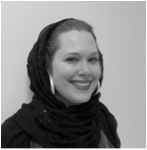 Deonna Kelli Sayed lived in Bahrain for several years where she conducted creative writing workshops, helped establish a grassroots artists’ organization, and wrote for lifestyle magazines. Upon returning to the United States in 2008, she became fascinated with paranormal reality TV and starting “ghost hunting” . These shows – and this weird avocation – intrigued her. She realized that America’s contemporary supernatural interest has a great deal to do with a post 9/11 identity. She wanted to explore this and wrote her first book, Paranormal Obsession: America’s Fascination with Ghost, Hauntings, Spooks & Spirits, which is a cultural studies discussion around paranormal reality TV.
Deonna Kelli Sayed lived in Bahrain for several years where she conducted creative writing workshops, helped establish a grassroots artists’ organization, and wrote for lifestyle magazines. Upon returning to the United States in 2008, she became fascinated with paranormal reality TV and starting “ghost hunting” . These shows – and this weird avocation – intrigued her. She realized that America’s contemporary supernatural interest has a great deal to do with a post 9/11 identity. She wanted to explore this and wrote her first book, Paranormal Obsession: America’s Fascination with Ghost, Hauntings, Spooks & Spirits, which is a cultural studies discussion around paranormal reality TV.
An excerpt from Deonna’s story, “Even Muslim Girls Get the Blues”:
“Risking my emotional well-being to tell Sayed of my love was one of the most important decisions I ever made in my life. The lack of male attention I had gotten before Sayed had me convinced that I was a metaphysical mistake. Being overweight did not counteract that assumption. I felt that I was not good enough for thinness-obsessed American men, or, it appeared, for anybody else. After multiple experiences of not being accepted by someone I had feelings for, it was unthinkable that my affections for an accomplished, kind man would be reciprocated. But I had a decision to make: I could live in fear of rejection and the not-ever-knowing, or I could go ahead and get rejected and then move on.”
To read the rest of Deonna’s story, order Love, InshAllah today!
Why were you drawn to this project?
Our romantic landscapes as women – the who, why and how we love – is what makes us human. I found the concept behind Love, Insh’Allah to be liberating; even revolutionary, as Muslim women are too often depicted in frigid, stereotyped semantic space. Peruse any bookstore and the majority of books relating to the female Muslim experience promote victimization. It seems that we can’t speak unless we do so from a platform of inadequacy. This infuriated me. It did not reflect my experience or that of the many other Muslim women I know. I felt Love, Insh’Allah would be an impressive opportunity to expand the discourse and I wanted to be part of that.
What was the most challenging part of sharing your story?
Locating an authentic voice for the essay, which details one particular truth about my marriage. Yet, the essay did not reflect my real emotions at the time. During the writing process, I felt that I could not say what I really wanted to; namely, that I was no longer happy in the marriage. I felt soul-depleted and bone dry. Living apart from my husband for several years and single parenting had taken a heavy burden, but I felt I couldn’t share that at the time. I wasn’t ready to face it myself. However, it bothered me that I could not write authentically. It concerned me as a writer and as a wife.
My marriage is now in the process of ending. That is another story! Yet, “White Girls Sometimes Get The Blues” is certainly an authentic discussion about my initial journey and I am proud of the essay. In fact, it opened an emotional, transformative space to assess and come to some profound conclusions about my marriage.
If there’s one thing that you hope readers will take away from your essay, what is it?
Love, life, and personal journeys are never inert. We are constantly morphing, and our romantic lives often serve as hubs and parameters for these things. I think challenging inertia is important for American-Muslim women; particularly as so many view us as static, stagnant, and singular in our subjectivity. We are anything but inert. What I hope readers take from Love, Insha’Allah is an appreciation for our marvelous complexity and how humorously human we are in our sexuality and emotional needs. Muslim women are like all other women, and for many, that is an amazing realization.











